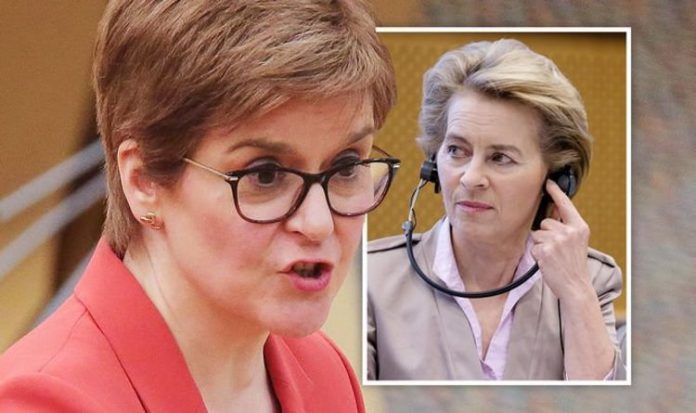The SNP’s momentum continues to grow as support for Scottish independence persists in recent polling. A SavantaComRes/Scotsman poll released this month had support for secession at 51 percent, while a No vote had just 38 percent. Polling in the latter half of 2020 consistently put a Yes vote above 50 percent, even as high as 58 percent in one survey. Nevertheless, with Brexit and the coronavirus pandemic causing big shifts for the UK’s economy, the debate over how an independent Scotland would fare on the fiscal side of things continues.
In 2017, various business leaders and experts offered their thoughts on how the country would get on.
Richard S Grossman, Professor of economics at Wesleyan University in Connecticut, and a visiting scholar at Harvard, wondered where the money would come from.
He also doubted whether the EU would help Nicola Sturgeon and co as much as some Scottish nationalists believe.
He said: “My sense is it would be very difficult to maintain Scotland’s current level of economic prosperity. I read extensively the Yes and No sides’ cases in the 2014 referendum and the Yes one was completely unrealistic.
“I kept wondering where all the money was going to come from. I don’t think money will come from Brussels if Scotland joins the EU.
“I can understand the rage at Brexit but over the next couple of years Nicola Sturgeon has to put forward a plan of how she is going to make an independent Scotland economically viable.
“Scotland has a lot going for it – technology, oil, a highly educated population and so on – but she still has to have a plan about issues like currency and cross-border trade.”
Meanwhile, Adam Posen, a former member of the Bank of England’s interest rate-setting committee warned of years of “painful austerity”.
He added: “Could Scotland make it on its own? Sure. But it would require a combination of both budget cuts and tax increases.
READ MORE: Nicola Sturgeon’s oil crisis ‘final nail in coffin for independence’
“It wouldn’t be easy but Scotland could cope. It wouldn’t be like Greece but it would require many years of austerity and change to make it work.”
However, Tax Research UK’s Richard Murphy told the Daily Record that Scotland should take on the euro, and could succeed outside of the union.
He said: “I do see it is possible for Scotland to stand as an independent state.
“I don’t pretend it would be without difficulty but, bluntly, I don’t see any country in Europe that won’t be facing difficulties soon.”
Belgian MEP Phillipe Lamberts told Express.co.uk that Scotland could “definitely” join the EU.
DON’T MISS
Nicola Sturgeon warned of 10-year fight to join EU [INSIGHT]
Scotland will have to endure ‘painful’ process to join EU [ANALYSIS]
Nicola Sturgeon warned IndyRef2 ‘must involve all of UK’ [INSIGHT]
He even suggested First Minister Sturgeon could be a candidate for European Commission President one day.
He said: “There would be no obstacle for Scotland joining if the UK is no longer in the EU.
“And this time independence would be different, because in 2014 Scotland would have left the UK and the EU at once.
“Now Scotland is leaving a smaller union to join a bigger union.
“Nicola Sturgeon comes across as a genuine person, politically astute and someone whose word can be trusted, whereas Boris Johnson comes across very quickly as someone you can’t trust.
“I can imagine Nicola Sturgeon being president of the European Commission, she seems to be much closer to the centre of gravity of European politics than Boris Johnson is.”







